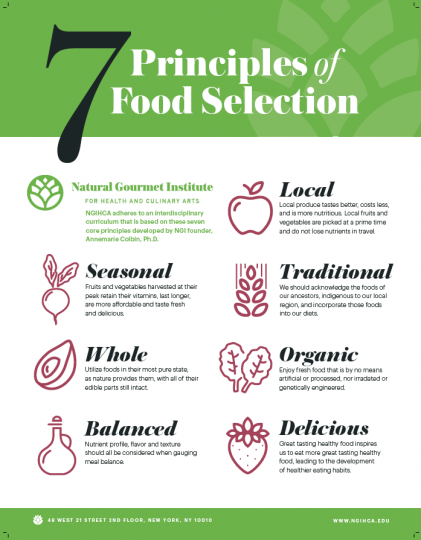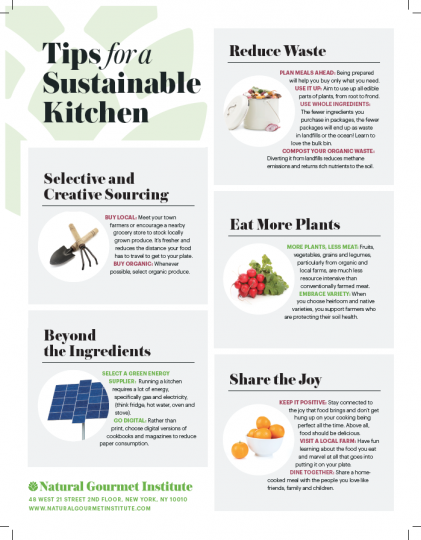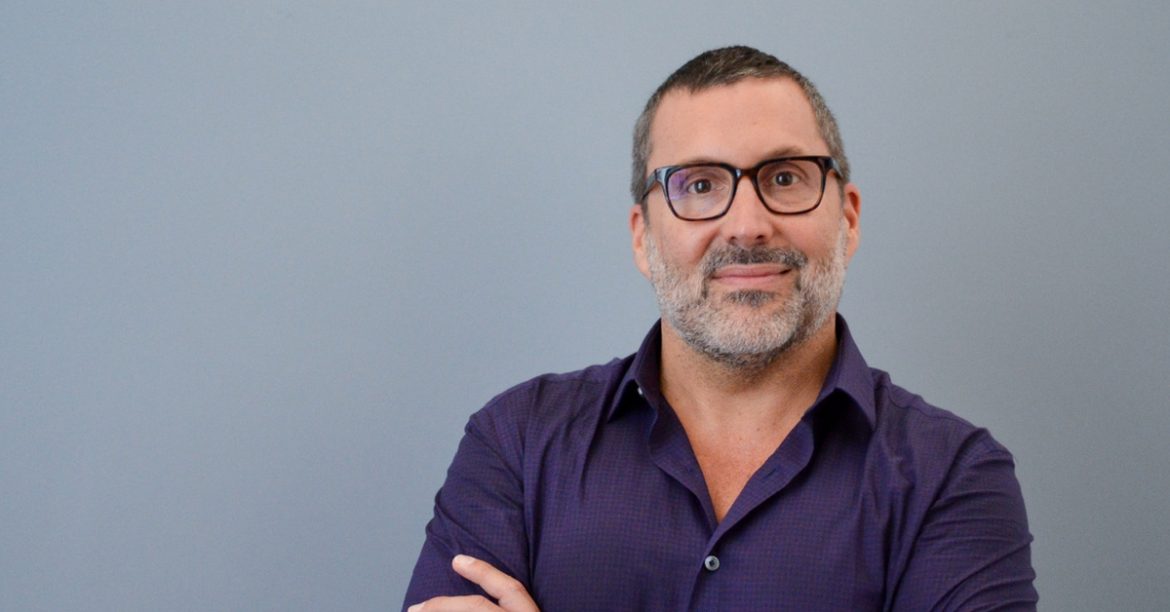Each month we ask a new eco-maven 18 questions about his or her life, occupation, and advice for other like-minded people. This month we connected with Jonathan Cetnarski, President and CEO of New York’s Natural Gourmet Institute.
1.What is your name?
Jonathan Cetnarski
2.What is your occupation?
President & CEO of Natural Gourmet Institute (NGI), the leading health-focused culinary school, located in New York City.
3.Do you have a “green” memory growing up?
My summer vacations were spent working as a camp counselor. The experience taught me the importance of respecting all elements of nature and ensuring that one leaves a natural space the same way one found it – I have never forgotten that lesson.
4.What’s your favorite meal?
Pasta. I love fresh whole wheat pasta sautéed with seasonal vegetables, olive oil, crushed red pepper, a little butter, and Parmesan cheese.
5.Where on the “green scale” do you fall?
I like to think I am pretty high on the scale. I work hard to limit my carbon footprint, minimize waste, and find ways to recycle or repurpose wherever possible. Here at NGI we always aim to reduce our food waste. We do this by ensuring that we buy the right amount of fresh produce for every class so that our leftovers are few or none. If something in the walk-in is starting to wilt, one of the chefs will take it upon themselves to make a staff snack.
6.What are the most rewarding and most challenging parts of your job?
Throughout our 39-year history, NGI has set the standard of what it means to be a natural foods chef who understands the intersection of food and health. Today, we find ourselves at the center of the better food movement and my biggest challenge is to ensure that NGI can contribute our unique food expertise to a better food system for the world at large. The most rewarding aspect of my job is enabling our students – both the chefs in training and our recreational participants – to become more knowledgeable and confident on how to prepare meals that are balanced and delicious, and made with whole, local and organic ingredients whenever possible.
7.Where do you turn for your news?
I draw from an array of different news sources, then synthesize the content to ensure that I am getting the most balanced and accurate information. NPR continues to be an important source for me.
8.What is one environmental change you vow to make in the next year?
Eliminating the use of plastic wherever possible and working with the Presidio School of Management to find new ways to make the NGI kitchens more sustainable.
9.What’s your favorite book?
I enjoy reading and can’t choose just one, but a few of my favorites are Running with Scissors by Augusten Burroughs, The Sun Also Rises by Ernest Hemingway, and The First Man in Rome by Colleen McCullough.
10.What inspired you to want to become a part of the Natural Gourmet Institute?
It was the school’s mission to educate chefs, individuals and communities to be leaders in the conversation about food and well-being through the preparation of natural and healthful meals. I wanted to join the “legion of NGI change agents” who are making positive impacts to food and health, globally – it was very inspiring!
11.Can you talk a little bit about the “sustainable food movement,” what it is, and why it’s important to you?
This is a great question and one that could take hours to answer. There are many different interpretations of what this movement is about, but it is generally defined as a need to provide healthy food to meet current and future needs while maintaining healthy ecosystems for generations to come. The movement also focuses on a return to local production and distribution practices (food patriotism), ensuring that real, nutritious food is made available and affordable to all, and advocates the use humane practices for workers, animals and communities.
This movement is critical for the longevity of the planet and its inhabitants. We need to return to the past to ensure a bright future. We need to feed the population with real food. We need to ensure we do not kill the oceans or deplete nutrients from the soil. We need to protect endangered species (like bees) from harmful chemicals and pesticides. At NGI, we embrace traditional foodways, as they are vital for the health and wellbeing of the planet.
12.What advice do you have for readers on eating sustainably?
NGI’s 7 Principles of Food Selection is a great primer for sustainable eating, along with our Tips for a keeping a Sustainable Kitchen.


13.Natural Gourmet Institute often focuses on vegan cooking; do you lead a vegan lifestyle?
NGI is definitely a vegan-friendly school as our curriculum is over 85% plant-based. We believe in eating a plant-heavy diet, which makes us experts in vegan and vegetarian cuisines, but the school’s philosophy ensures that we are inclusive of all diets and beliefs. With that said, we do not vilify meat and dairy, and understand that for many people, a healthy diet may include moderate amounts of humanely-produced animal foods. My diet is very NGI and I am probably best described as a Flexitarian. 90% of my diet is plant-based. I eat dairy and eggs in moderation and occasionally animal proteins, which are limited to poultry and fish.
14.Do you think it’s important for people to learn about buying, cooking and eating vegan? If so, why?
I think it is important for people to be educated about food in general. People are eating far too many processed or artificial food products and it is just not good for long-term health and well-being. Small victories can be made on any budget, just by being mindful. I think a plate should be complete with the right fats, proteins and complex carbohydrates. It should be full of vegetables, but does not have to be exclusively vegan.
15.If there were one industry/product that you could make more sustainable, other than the food industry, what would it be?
Clothing manufacturing. The environmental damage created by hyper production is so detrimental to the planet.
16.What’s next for Natural Gourmet Institute? Any plans on expanding to different locations in the future?
Earlier this year we ran our popular Culinary Nutrition Certificate Program in Los Angeles. We were very excited with the response and are looking at other locations for the future, but for now our home continues to be in the Flatiron District of NYC. We have also started to do some consulting to help companies and institutions find ways to get more healthful food in their programming, which is a branch of NGI we look forward to expanding soon.
17.What do you want the Natural Gourmet Institute’s legacy to be?
The team and I are guardians of a dream started by our founder, Annemarie Colbin, PhD. In 1977, she understood that people needed a place they could go to be educated on how to prepare healthful meals for themselves and their families. Annemarie helped countess people live better lives by giving them the tools they need to make informed choices about food. I want to continue this legacy while positioning NGI to help solve food problems on a global scale.
18.Can you recommend a few sustainable restaurants for our local NYC readers?
Everyone always wants to know my restaurant list! NYC has many wonderful and sustainable restaurants, many owned and operated by NGI alumni. I would suggest that people look for places that make organic, seasonal and humane food a focal point. I love Dirt Candy, a vegetable restaurant from alum Amanda Cohen, Dimes, a hip downtown eatery from alum Alissa Wagner, as well as Ellary’s Greens, a plant-forward cafe in the West Village. I also recommend that you stop into NGI on Friday night for our legendary Friday Night Dinners. Every week, we serve a brand new, three-course vegan meal that is prepared and served by our chefs in training. It is BYOB and not to be missed!
 Food
Food Farmers
Farmers Sustainable Living
Sustainable Living Living Planet
Living Planet News
News